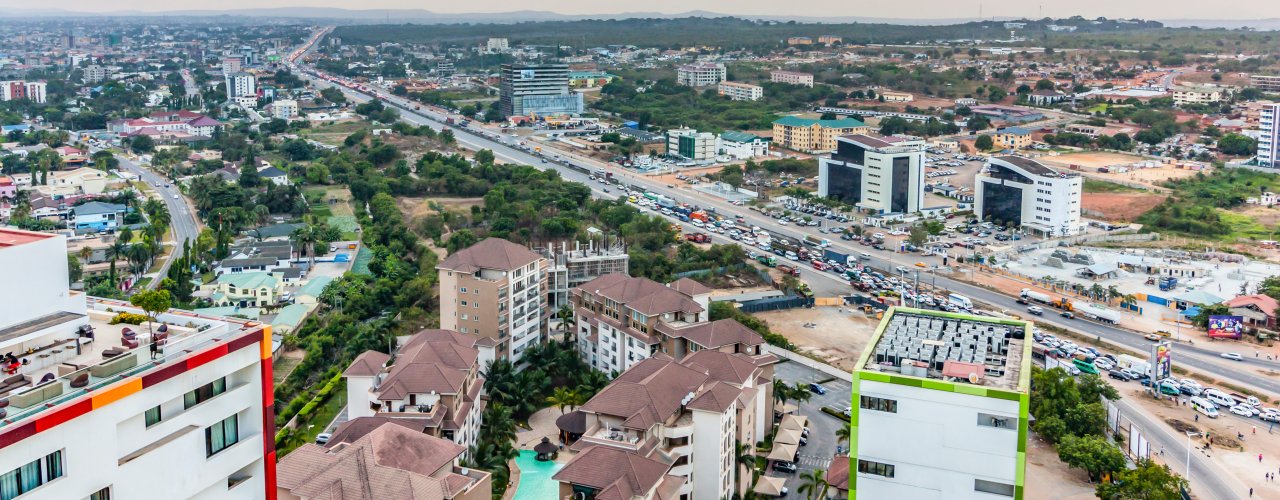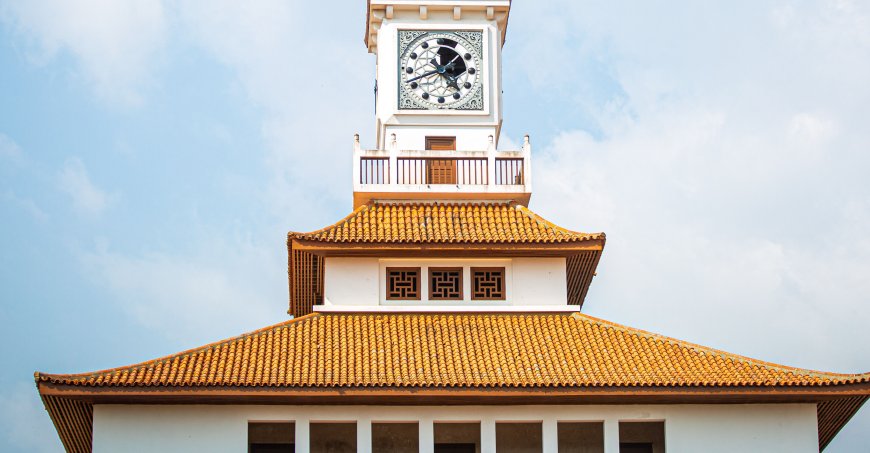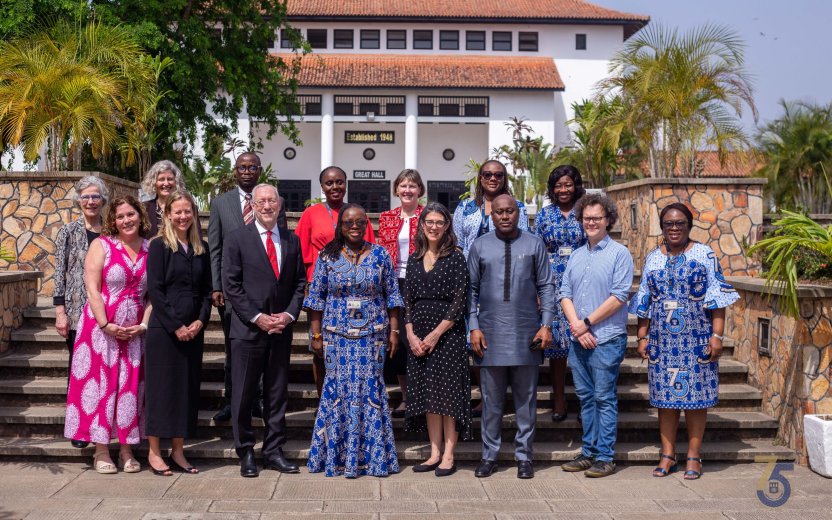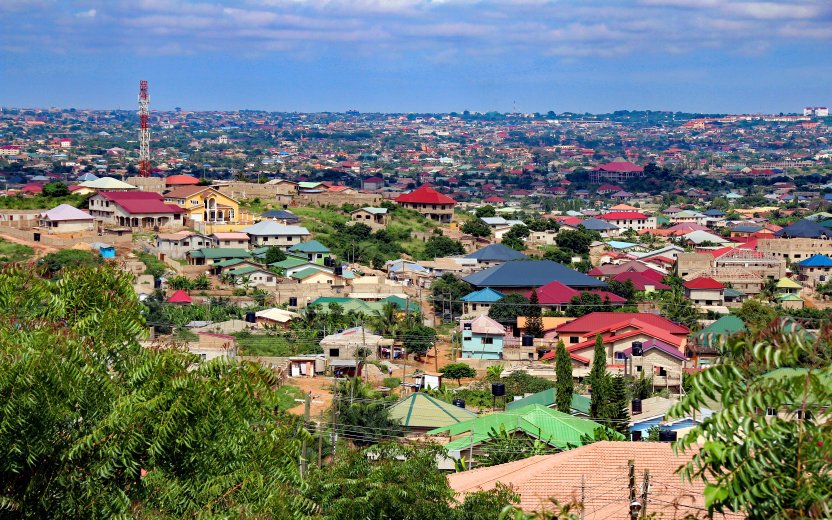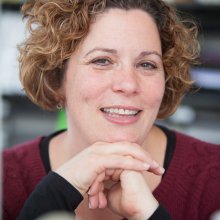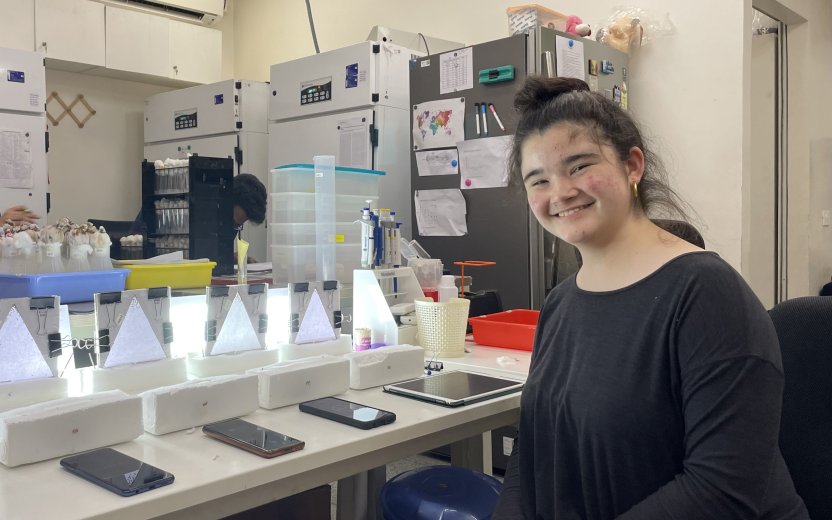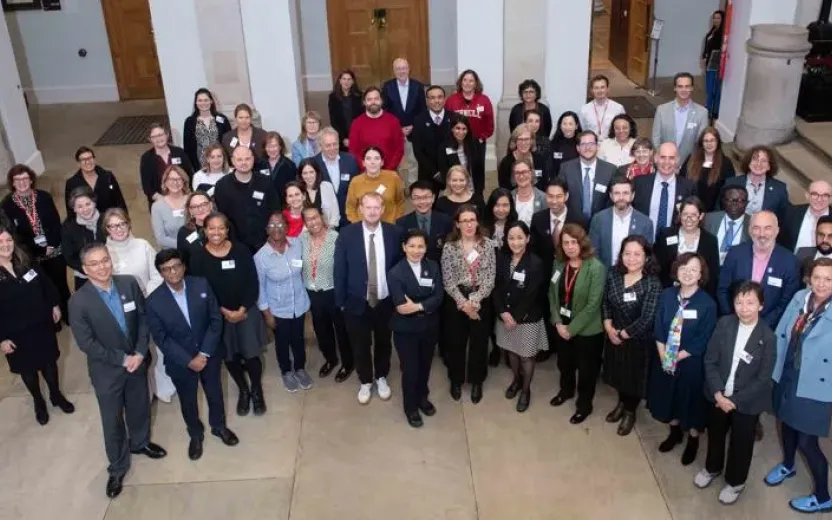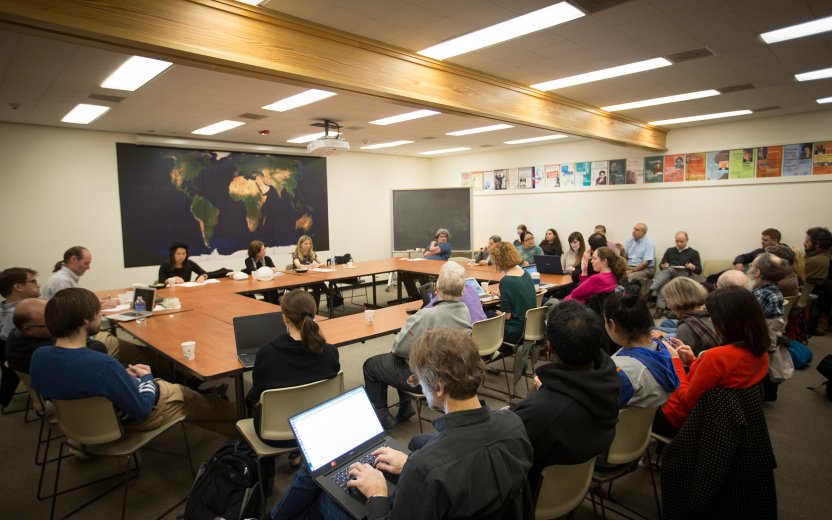Ghana
Hubs Partner: University of Ghana
Founded in 1948, the University of Ghana in Accra is the country’s oldest and largest university, recognized for its diverse academic community and strong research. With four colleges and multiple research centers, the university prioritizes climate change, public health, food security, and policy development. It enrolls students from 87 countries, and its faculty and researchers play a leading role in shaping policy and advancing knowledge across the region.
Deepening Existing Collaborations
Cornell, Ghana, and the World
A Cornell delegation visited the University of Ghana in 2024 to attend a conference and connect with colleagues to solidify opportunities for study abroad, internships, co-teaching, research, and community engagement. Cornell leaders also met with Cornell alumni leading nongovernmental organizations that host Cornell student internships.
International Classrooms
Marla Love, dean of students, and Dannemart Pierre, associate dean of students for student empowerment, led a cohort of Cornell students on spring break to the University of Ghana in 2024 and Denmark in 2023. The programs were supported by Global Cornell ICC grants, which help faculty create meaningful international experiences.
A History of Collaboration
The University of Ghana and Cornell have a long history of research collaborations across disciplines:
- African Studies – The Einaudi Center's Institute for African Development partners with University of Ghana's Institute of African Studies, one of the oldest African studies centers on the continent.
- Sustainability: Faculty and students work with Ghana's Center for Climate Change and Sustainability Studies on environmental challenges in West Africa.
- Migration Studies: The Einaudi Center's Migrations Program (formerly Migrations: A Global Grand Challenge) collaborates with Ghana's Center for Migration Studies, the only migration-focused research and teaching center in sub-Saharan Africa.
- Crop Sciences: Cornell's College of Agriculture and Life Sciences (CALS) partners with Ghana's West Africa Centre for Crop Improvement (WACCI) to advance plant breeding and agricultural innovation.
WACCI was founded in 2007 through collaboration with Cornell to train plant breeders focused on African crops. It has since become a leading agricultural research and education institution across sub-Saharan Africa. WACCI Director Eric Yirenkyi Danquah, an adjunct professor at CALS, has been widely recognized for his contributions to food security and agricultural innovation.
Research Highlights
Global Hubs Collaboration Receives NSF Design Grant
Hubs seed funding grows long-term collaborations.
A Cornell-led project team with Global Hubs partners in Ghana, India, the UK, and Singapore received a $250,000 NSF grant to design climate vulnerability solutions.
The Global Center for Household Energy and Thermal Resilience (HEaTR) began with Alex Nading’s 2022 joint seed grant with University of Edinburgh anthropologist Jamie Cross.
Cornell-Ghana Joint Research Seed Grant Awards 2024
"Urban Form and Residential Energy Consumption in Accra, Ghana" | Stephan Schmidt (Cornell) and Isaac Arthur (Ghana)
"Maternal And Neonatal Factors on Long-Term Immune Responses to Childhood Vaccines in Uninfected Children Born to HIV-Infected Mothers" | Kirk Deitsch (Weill Cornell Medicine) and Frederica Partey (Ghana)
"Cultural and Ethical Dimensions of Generative AI Communication: A Collaborative Study between Cornell Engineering Students and Ghanaian Students of English" | Hua Wang (Cornell) and Nancy Henaku and Kwaku Owusu Afriyie Osei-Tutu (Ghana)
“Femtosecond Fiber Lasers for Precision Material Processing” | Frank Wise (Cornell) and Joanna Hodasi (Ghana)
Improving Lives in Accra’s Informal Settlements
With support from a 2023 Hubs joint seed grant, Victoria Beard (Cornell) and Austin Abloare (Ghana) are developing a research agenda to improve infrastructure, public health, and economic opportunity in underserved urban communities.
Student Experiences
Hub partnerships have enriched students' academic and pre-professional experiences and expanded their opportunities to engage inside and outside the classroom.
Cornell's colleges of Agriculture and Life Sciences, Arts and Sciences, and Human Ecology have sent students to study at the University of Ghana.
Max Worman '24 (third from left) with students and faculty from the Cornell summer course at the University of Ghana.
“My time in Ghana allowed me to fully immerse myself in a new culture and environment. I enjoyed having the chance to try Ghanaian cuisine and improve my Twi language. Throughout my internship, I was able to work with various Ghanian government agencies as well as the education system.”
Eliana Amoh '26 spent two months as a Global Intern with Lead for Ghana. Read her account.
“The number one lesson that I got from the experience was the importance of being teachable. I had to go outside of my comfort zone and work in AI, financing, and fundraising during the internship. With the support of staff and having an open mind, I was able to gain skills in these areas.”
Global Internships and Study Abroad
Cornell's Institute for African Development (IAD), part of the Mario Einaudi Center for International Studies, has long-standing connections with University of Ghana's Institute of African Studies, established in 1961—one of the oldest African studies centers on the continent.
For many years, IAD has offered internships in Accra and across the African continent, now through Global Internships managed by the Einaudi Center and Office of Global Learning. IAD's internships reinforce academic learning by providing undergraduates the opportunity to engage and conduct research with individuals and organizations directly involved in policy and program development in Africa. Outgoing Cornell students also study abroad in Ghana. Learn more about student experiences at Global Hubs.
Explore study abroad experiences at Global Hubs
Faculty Forward
Cornell Faculty Lead: Paula Cohen
Professor of Genetics, College of Veterinary Medicine
Director, Center for Reproductive Genomics
Associate Vice Provost for Life Sciences
Paula Cohen's research focuses on the regulation of meiosis in mammals, with special emphasis on how meiotic recombination is controlled. Her lab's research is primarily on the role of various DNA repair pathways, most notably the DNA mismatch repair (MMR) family. Initially characterized by their role in DNA repair and the etiology of human colorectal cancer, the MMR family is important for genome stability in a variety of organisms.
A New Chapter for Cornell Alumni in Ghana
Cornell’s alumni community in Ghana continues to grow!
The recent launch of the Cornell Club of Ghana provides a new way for alumni in the region to connect and collaborate. Many University of Ghana faculty are Cornell alumni, strengthening ties between Cornell and the region and expanding Hubs network opportunities for research, academic collaborations across disciplines, student internships, and community engagement.

